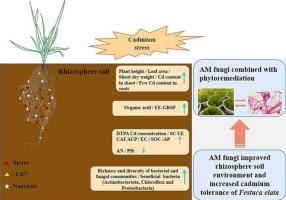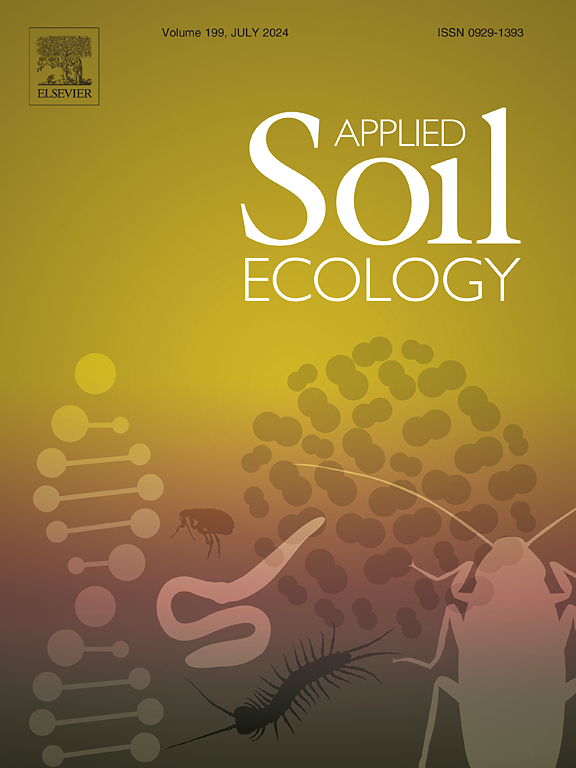Arbuscular mycorrhizal fungi alter microbiome structure of rhizosphere soil to enhance Festuca elata tolerance to Cd
IF 4.8
2区 农林科学
Q1 SOIL SCIENCE
引用次数: 0
Abstract
The remediation of heavy metal cadmium (Cd) contaminated soil has attracted much attention. Arbuscular mycorrhiza (AM) fungi combined with phytoremediation is an efficient, economical and environmentally friendly remediation strategy. However, it is not clear the regulation of AM fungi on Cd stress by altering microbiome structure of rhizosphere soil. Here, Funneliformis mosseae was inoculated to determine the Festuca elata growth indexes, organic acids secreted by roots, Cd uptake, and rhizosphere microbial community in soil cultivation. The results showed that under Cd stress, AM fungi promoted the plant growth compared with no inoculation group. Cd contents in shoot and root cell wall increased by 20.63 %, and 16.66 %, respectively. The activities of soil saccharase and urease, and the absorption capacity of nitrogen were significantly increased upon AM fungi symbiosis. Meanwhile, AM fungal symbiosis promoted the secretion of organic acids from plant roots, reduced rhizosphere soil pH, and significantly increased the concentration of DTPA Cd in soil. Furthermore, AM fungi increased the relative abundance of beneficial rhizosphere bacteria (Actinobacteriota, Chloroflexi and Proteobacteria), which could resistant the heavy metals stress and promote plant growth. Correlation analysis showed that total organic acid content was significantly positively correlated with Myxococcota, Chloroflexi and Glomeromycota. It is suggesting that AM fungi could enhance the resistance to Cd stress in F. elata by altering the rhizosphere microbial community. These findings provide insights into the effects of AM fungi on plants growth and rhizosphere microorganisms under Cd stress, and provides theoretical basis to further improve Cd-contaminated soil phytoremediation.

丛枝菌根真菌改变根瘤土壤的微生物组结构,提高马齿苋对镉的耐受性
重金属镉(Cd)污染土壤的修复备受关注。丛枝菌根(AM)真菌与植物修复相结合是一种高效、经济、环保的修复策略。然而,AM 真菌通过改变根瘤土壤微生物组结构对镉胁迫的调控作用尚不清楚。本文接种了Funneliformis mosseae,测定了土壤栽培中Festuca elata的生长指数、根系分泌的有机酸、镉吸收量和根圈微生物群落。结果表明,在镉胁迫下,与不接种组相比,AM 真菌促进了植物的生长。芽和根细胞壁中的镉含量分别增加了 20.63 % 和 16.66 %。AM真菌共生后,土壤糖酶和脲酶的活性以及对氮的吸收能力显著提高。同时,AM 真菌共生促进了植物根部有机酸的分泌,降低了根圈土壤的 pH 值,并显著提高了土壤中 DTPA Cd 的浓度。此外,AM 真菌还增加了根圈有益菌(放线菌、绿僵菌和蛋白菌)的相对丰度,从而可以抵抗重金属胁迫,促进植物生长。相关分析表明,总有机酸含量与 Myxococcota、Chloroflexi 和 Glomeromycota 呈显著正相关。这表明 AM 真菌可以通过改变根瘤微生物群落来增强 F. elata 对镉胁迫的抗性。这些发现有助于深入了解镉胁迫下AM真菌对植物生长和根瘤微生物的影响,为进一步改善镉污染土壤的植物修复提供了理论依据。
本文章由计算机程序翻译,如有差异,请以英文原文为准。
求助全文
约1分钟内获得全文
求助全文
来源期刊

Applied Soil Ecology
农林科学-土壤科学
CiteScore
9.70
自引率
4.20%
发文量
363
审稿时长
5.3 months
期刊介绍:
Applied Soil Ecology addresses the role of soil organisms and their interactions in relation to: sustainability and productivity, nutrient cycling and other soil processes, the maintenance of soil functions, the impact of human activities on soil ecosystems and bio(techno)logical control of soil-inhabiting pests, diseases and weeds.
 求助内容:
求助内容: 应助结果提醒方式:
应助结果提醒方式:


